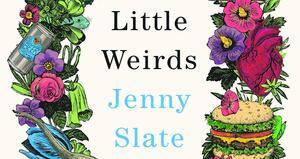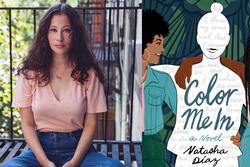Little Weirds, Lots of Tenderness
“The first thing that happened was that I was born,” writes Jenny Slate in Little Weirds. In her memoir, she self-assuredly introduces readers to the worldview she built after repairing her heart following divorce. Slate’s book, which was published just weeks after her Netflix special Stage Fright debuted, echoes central themes from her stand-up including anxiety and vulnerability.
Memoir is perhaps not the best way to describe Little Weirds because, although it centers on personal experience, its author is unconcerned by conventional constraints. Slate the protagonist takes turns showing up in the book as the whole person she is in her adult life, a child in her formative years, and a baby learning how to speak, as well as a croissant, a garden and, in an imagined dating profile, a self-named “color-spirit” (which isn’t a far-fetched concept in Jenny Slate’s world). As a writer, I couldn’t help thinking “I didn’t know you could do all of the things in one memoir,” as Slate’s book transformed from self-help on one page to surrealist manifesto on the next.
In the memoir, she strips away some of the comedic layers of her standup. This makes for an intimate reading experience; Slate speaks to the reader directly in Little Weirds, calling each one a “partner” on her journey to discover what being alive today means. As the title suggests, Slate lets her audience into her whimsical view of life, which to her is a continuous celebration. The book consists of specific moments of joy and observations from her everyday life. (Ephemeral statements like “now is a treat” and, to a future lover, “I will give you my every treat” are peppered throughout the book.) Memoirs often feel like the writing of a friend letting you into their life story. In this case, that friend is Slate, and the reader is bound to find herself saying “Oh Jenny, only you would say it in that specific way.”
At every turn, Slate’s Little Weirds invites readers into her private world. In the first few pages of the essay “My Mother,” Slate manages to make readers feel like they know everything there is to know about her relationship with her beloved mom. In “Restaurant,” previously published by The New Yorker, she gives readers a glimpse of her everyday routine. As if describing her existence to aliens, she writes, “I take a little brush, and I slick black paint over each eyelash, and then I take a hot metal stick and wind my head-hairs around it so that everything is spirals.” Little Weirds is often about how the actions we perform on a daily basis are in fact quite, well, weird. To Slate, nothing is too mundane to escape the gaze of self-awareness, which she has honed over time.
Even when she seems to approach the territory of gimmick, her writing carries a deeper message. She seems to be on a perpetual quest to know herself and understand what it means to become more of herself. “What if I could always be a little bit on this island in my mind? What if I could always be a little bit naked, a little bit kissing everything, an unplundered trove of my own love?” Through online interviews, I discover Slate denouncing critics for calling her comedy “quirky” and for not taking her as seriously as they do male comics. In the context of these interviews, Slate's Little Weirds becomes surprisingly radical, almost an act of protest.
Ultimately, the reader can’t help but feel affirmed by her willingness to share. She’s not vulnerable in the trendy, Brené Brown kind of way. She’s letting you in on thoughts that show her nature, not just her behavior during a particular experience, as sensitive and curious. And the questions she asks can break your heart a little, exposing room for perpetual vulnerability. “When I die, will I turn into a ghost or just be garbage until I am part of a garden?”
As the essays continue, Slate’s search for post-divorce healing is ever-present and uplifting in its honesty. When I started talking to friends about her memoir, I learned that many of them, my female friends in particular, share an interest in Slate’s work. Some said they loved her in movies and TV sketches; others shared tidbits from her Instagram and appearances on late night shows. Slate has taken every opportunity to share the process of becoming an honest, feminist, insightful, and resilient human with her fans. Her efforts resonate, and I’m grateful for her transparency.
Little Weirds is one of JWA’s 2019-2020 Book Club picks.






